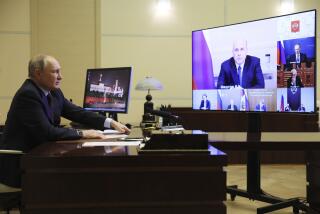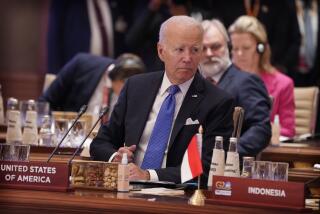India nuclear pact is OKd
- Share via
WASHINGTON — After three years of negotiation, Congress gave final approval Wednesday to a U.S.-India nuclear agreement that its advocates say will form a lasting strategic alliance between the United States and the world’s largest democracy.
The agreement, which the Bush administration considers a significant foreign policy achievement, would end a 30-year ban on sales of nuclear fuel and technology that was imposed after India tested and developed a nuclear bomb.
India has agreed to open its civilian nuclear facilities to international inspection under the Nuclear Nonproliferation Treaty, though its eight military nuclear plants would not be subject to scrutiny.
The vote in the Senate was 86 to 13. California’s senators, both Democrats, were split, with Dianne Feinstein voting in favor and Barbara Boxer opposed. The agreement, passed by the House last week, now goes to President Bush for his signature.
Advocates contend that the deal will finally forge a partnership with a country that has long kept its distance from the United States, and will help strengthen India to offset China’s dominance in Asia.
Bush praised the vote, saying the agreement “will strengthen our global nuclear nonproliferation efforts, protect the environment, create jobs and assist India in meeting its growing energy needs in a responsible manner.”
But critics on the left and right have complained from the beginning that by rewarding a country that ignored international nonproliferation efforts, the deal will make it harder for world powers to contain the spread of nuclear weapons to countries such as Iran, and may even accelerate nuclear arms races.
In debate on the measure Wednesday, Sen. Byron L. Dorgan (D-N.D.) said, “This message is: You can misuse American nuclear technology and secretly develop nuclear weapons, you can build a nuclear arsenal in defiance of the United Nations resolutions, and you will be welcomed as someone exhibiting good behavior with an agreement with the United States of America. . . . What message does that send to others who want to join the nuclear club?”
But Sen. Christopher J. Dodd (D-Conn.) said there were “compelling geopolitical reasons” to approve the bill, mentioning India’s location near China, Pakistan and Afghanistan.
Administration officials increasingly see India as a key to its growing difficulties battling Islamic militants in Afghanistan and Pakistan. India has increasing economic and diplomatic clout in Afghanistan.
The deal has caused titanic political battles in New Delhi, where opponents contended that it would make India subservient to the U.S. The proposal nearly toppled Indian Prime Minister Manmohan Singh’s government.
Only last month, new turmoil erupted in India with the leak of a confidential letter from the U.S. State Department to the chairman of the House Foreign Affairs Committee, Rep. Howard L. Berman (D-Valley Village), that promised the United States wouldn’t sell sensitive nuclear technologies to India and would halt nuclear trade if New Delhi conducted a nuclear test.
Critics pointed to the letter as evidence that the deal would limit India’s strategic options.
In the debate Wednesday, the bill’s supporters tried to quiet critics in the U.S. by pointing out that under 2006 legislation on the deal, the United States will halt nuclear trade with India if New Delhi goes back on the agreement and conducts a nuclear test.
“Despite our disappointment with the overall deal, it is clear that if India violates its pledges on the nuclear moratorium there will be consequences,” said Daryl Kimball, executive director of the Arms Control Assn., a private nonprofit membership organization that promotes education on nuclear issues.
Administration officials worried at the beginning of last month that the deal might not be passed before Congress recessed for campaigning. But congressional leaders moved the bill along quickly, with only one hearing, to the distress of critics, who contended that more time was needed for deliberations.
Another factor in its approval may have been the reluctance of lawmakers facing reelection to alienate activists in the Indian American community, Kimball said. “Nobody wants to be jeopardizing campaign contributions at this point,” he said.
Bush called Senate Majority Leader Harry Reid (D-Nev.) early Wednesday to discuss the bill, even though both men were also preoccupied with the economic bailout package.
Some former administration officials have said they consider the deal one of the Bush team’s three most important foreign policy accomplishments, and its passage comes at a time when the Bush administration is sorely in need of a foreign policy success. The U.S. effort to persuade North Korea to give up its nuclear weapons appears to be unraveling again, and militants are gaining strength in Afghanistan and Pakistan.
--
More to Read
Get the L.A. Times Politics newsletter
Deeply reported insights into legislation, politics and policy from Sacramento, Washington and beyond. In your inbox twice per week.
You may occasionally receive promotional content from the Los Angeles Times.











